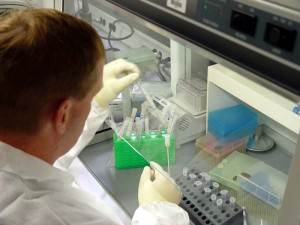 TEHRAN (ISNA)- Iranian researchers Shahin Rafiei, Arash Rafiei and Sina Rabbani as well as their colleagues at Weill Cornell Medical College have seemingly managed to facilitate injection of blood vessel cells to repair the damaged organs of patients and eliminate the need for donated organs and transplants.
TEHRAN (ISNA)- Iranian researchers Shahin Rafiei, Arash Rafiei and Sina Rabbani as well as their colleagues at Weill Cornell Medical College have seemingly managed to facilitate injection of blood vessel cells to repair the damaged organs of patients and eliminate the need for donated organs and transplants.In studies appearing in recent issues of Stem Cell Journal and Developmental Cell, the researchers show that endothelial cells -- the cells that make up the structure of blood vessels -- are powerful biological machines that drive regeneration in organ tissues by releasing beneficial, organ-specific molecules.
They discovered this by decoding the entirety of active genes in endothelial cells, revealing hundreds of known genes that had never been associated with these cells. The researchers also found that organs dictate the structure and function of their own blood vessels, including the repair molecules they secrete.
Together, the studies show that endothelial cells and the organs they are transplanted into work together to repair damage and restore function, says the study's lead investigator, Shahin Rafiei, M.D., a professor of genetic medicine and co-director of the medical college's Ansary Stem Cell Institute and Tri-SCI Stem Center. When an organ is injured, its blood vessels may not be able to repair the damage on their own because they may themselves be harmed or inflamed, says Dr. Rafiei, who is also an investigator at the Howard Hughes Medical Institute.
"Our work suggests that that an infusion of engineered endothelial cells could engraft into injured tissue and acquire the capacity to repair the organ," he says. "These studies -- along with the first molecular atlas of organ-specific blood vessel cells reported in the Developmental Cell paper-- will open up a whole new chapter in translational vascular medicine and will have major therapeutic application.
"Scientists had thought blood vessels in each organ are the same, that they exist to deliver oxygen and nutrients. But they are very different," and each organ is endowed with blood vessels with unique shape and function and delegated with the difficult task of complying with the metabolic demands of that organ, Dr. Rafiei adds.
By ISNA
The Iran Project is not responsible for the content of quoted articles.










